The Hawaii lease agreement is a vital piece of documentation that registers the information specific to the rental of a property/dwelling. Typically, before executing the document, the prospective tenant will submit an application to rent and await approval from the landlord. Once approved, both parties will have to come to an agreement on the terms of the contract. Important aspects of the lease agreement will include the time period of the tenancy, how much the monthly payment will amount to, and the rules & regulations regarding the use of the residence.
Lease Agreements by Type
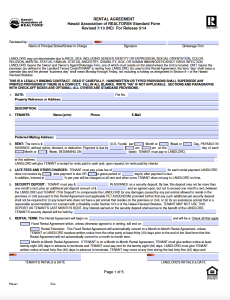 Hawaii Association of Realtors Rental Agreement – The form allotted by licensed realtors allows alternate documentation of the transaction to lease real estate. The document can be filled and amended to cater to the needs of each rental contract on an individual level.
Hawaii Association of Realtors Rental Agreement – The form allotted by licensed realtors allows alternate documentation of the transaction to lease real estate. The document can be filled and amended to cater to the needs of each rental contract on an individual level.
Download: PDF
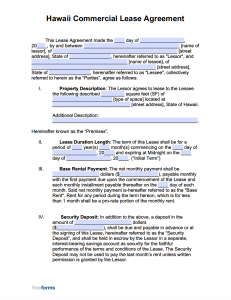 Commercial Lease Agreement – Exclusively used for properties that will house a company’s business affairs.
Commercial Lease Agreement – Exclusively used for properties that will house a company’s business affairs.
Download: PDF, Word (.docx)
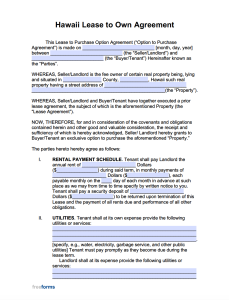 Lease to Own Agreement – If an interested party would like to acquire the right to purchase the real estate during the duration of the occupancy, they may execute this type of agreement if the landlord accepts.
Lease to Own Agreement – If an interested party would like to acquire the right to purchase the real estate during the duration of the occupancy, they may execute this type of agreement if the landlord accepts.
Download: PDF, Word (.docx)
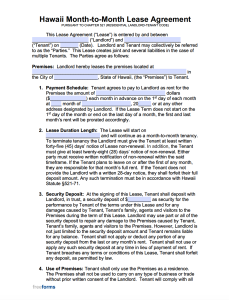 Month-to-Month Lease – Is a low-commitment agreement that enables either party to terminate the tenancy during any month. The only requirement is that the landlord has to provide forty-five (45) days’ notice of termination, whereas the tenant only has to provide twenty-eight (28) days’ notice (§ 521-71).
Month-to-Month Lease – Is a low-commitment agreement that enables either party to terminate the tenancy during any month. The only requirement is that the landlord has to provide forty-five (45) days’ notice of termination, whereas the tenant only has to provide twenty-eight (28) days’ notice (§ 521-71).
Download: PDF, Word (.docx)
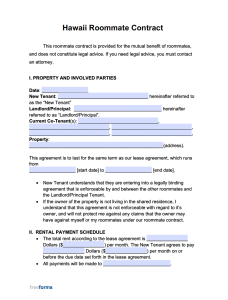 Roommate Agreement – If an individual who has an interest in a particular residential property would like to rent a room/section of the domicile, they may execute this form for the purpose of recording the arrangement.
Roommate Agreement – If an individual who has an interest in a particular residential property would like to rent a room/section of the domicile, they may execute this form for the purpose of recording the arrangement.
Download: PDF, Word (.docx)
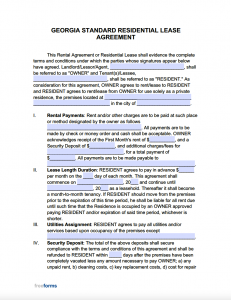 Standard Lease Agreement – Customizes documentation to transcribe the facts involved in a real estate leasing deal.
Standard Lease Agreement – Customizes documentation to transcribe the facts involved in a real estate leasing deal.
Download: PDF, Word (.docx)
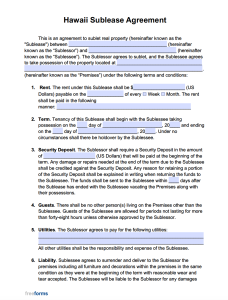 Sublease Agreement – Allows the original tenant to sublet the property to a new tenant as long as the principal lessor permits this action.
Sublease Agreement – Allows the original tenant to sublet the property to a new tenant as long as the principal lessor permits this action.
Download: PDF, Word (.docx)
Landlord-Tenant Laws
All the statutes that dictate the proper conduct between lessors and lessees can be found in Chapter 521 (Residential Landlord-Tenant Code) of Hawaii’s property law. The state’s Office of Consumer Protection also provides a reference manual called the Landlord-Tenant Handbook.
Required Landlord Disclosures
Condo Conversion (§ 521-38) – If a landlord of a property intends to convert the premises into a condominium project, they must alert the current tenant of the future plans one hundred twenty (120) days in advance of the termination of the lease.
Demolition (§ 521-71(c)) – If a landlord decides to demolish their property for whatever reason, they must give the tenant one hundred twenty (120) days’ notice prior to the building’s destruction or lease termination.
Landlord/Owner Information (§ 521-43(a)(b)) – The names & addresses of the individuals responsible for receiving notices/statements regarding the property being rented must be disclosed to the lessee upon the beginning of their tenancy. Such individuals would include property managers, the owners of the building, or the agents operating on their behalf.
Lead-Based Paint (42 U.S. Code § 4852d) – In every state within the U.S., it is mandatory that the landlord provide an educational pamphlet regarding the dangers of lead paint, as well as a disclosure of any known lead hazards contained within the property being rented. (This requirement is specific to the leasing of residential property that was built before 1978.)
When is Rent Late?
Unless otherwise specified within the agreement, rent is deemed late the following day after the date settled upon within the terms of the contract (§ 521-21(b)). The state does not impose a compulsory amount of days for a grace period (as stated within Page 26 of the Landlord-Tenant Handbook).
Late Fees
It is up to the discretion of the landlord on the amount in which they will charge for a late rent payment, as Hawaii does not mandate a maximum fee. This charge should be stated within the lease/rental agreement before the tenant occupies the property (as indicated on Page 4 of the Landlord-Tenant Handbook).
NSF Checks
The penalty for a dishonored check must be declared within the rental agreement (as expressed in Page 4 of the Landlord-Tenant Handbook). The state does not provide a set fee for returned checks.
Security Deposit Maximum
Hawaii law contains a statute that restricts landlords from requesting more than the amount of one (1) month’s rent for a security deposit payment (§ 521-44(b)). If the tenant owns a pet, the landlord is permitted to ask for additional funds in case of damage caused by the animal.
Security Deposit Return
The lessor is obliged to return the entire security deposit within fourteen (14) days of terminating the lease agreement (§ 521-44(c)). If the property sustained damages during the tenancy and the lessor is entitled to compensation, they must provide the lessee with a written list containing descriptions for each deduction.
Landlord’s Entry
In order to acceptably enter a tenant’s dwelling, a landlord is compelled to give a minimum of two (2) days’ notice preceding entry to the premises (§ 521-53(b)).


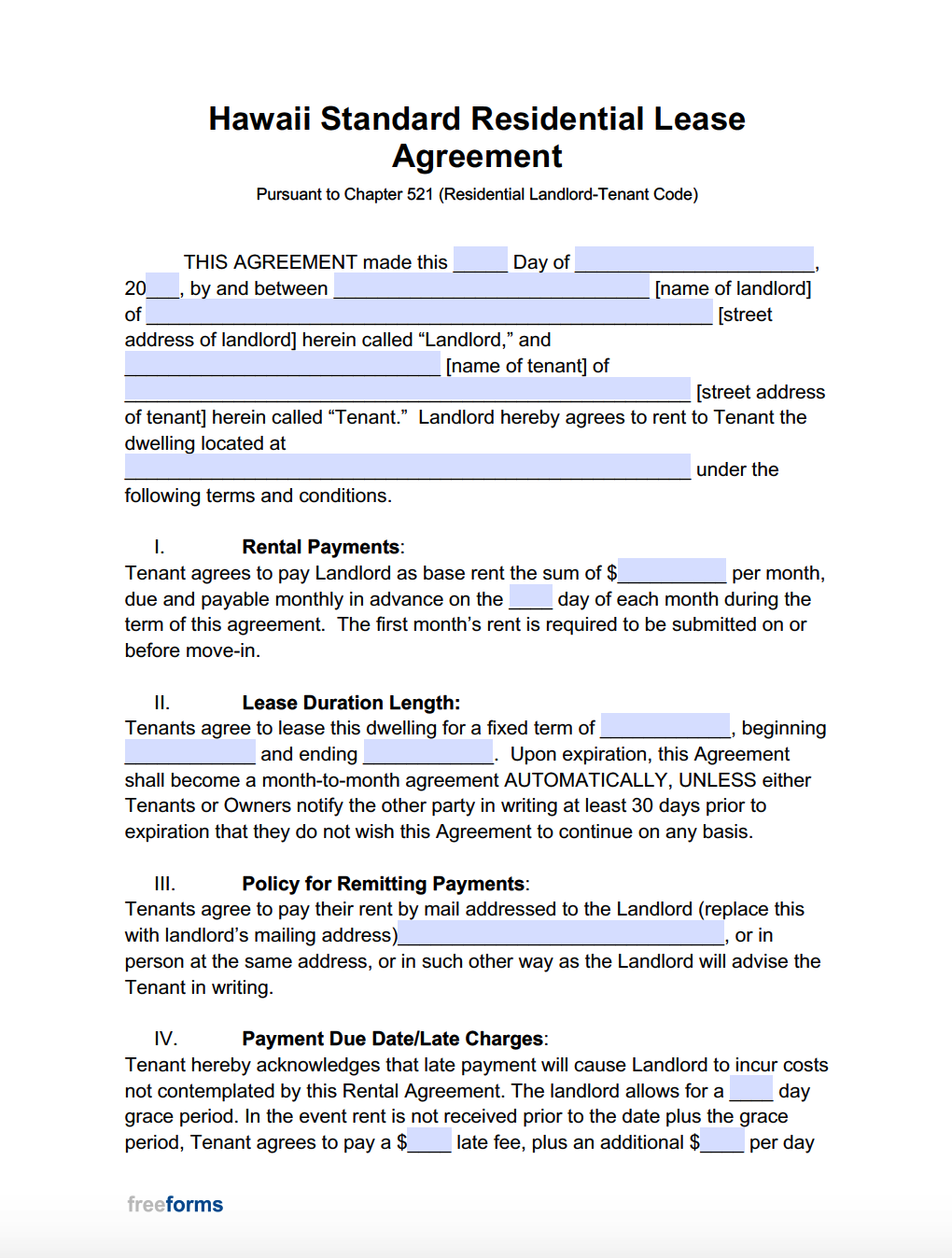
0 comments
Comments are closed.